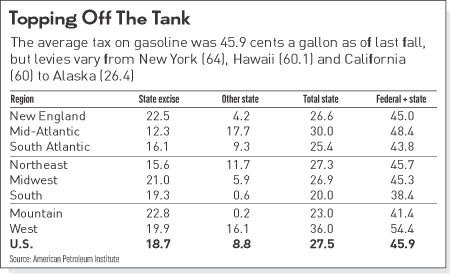From IBD:
Posted 4/26/2006
Energy: Most Americans would be happy with any relief they could get from today's painful gasoline prices. Will the only people who can actually help respond?
We're talking, of course, about lawmakers, including the 535 members of Congress and all state legislators. But we're not talking about these officials' abusing their authority and setting price caps. That's a sure way to create shortages. No, what we're suggesting is drop — at least during the rough summer stretch of which we've been warned — the taxes that are applied to gasoline at the pump.
If just the federal gas tax was suspended, drivers would see pump prices drop 18.4 cents a gallon, not-insignificant relief at a time when $50 fill-ups are becoming routine.
Eliminating the federal tax would save a family that fills up a 15-gallon tank twice every seven days $5.52 a week — or $287 per annum. Working families that have little flexibility in their budgets — and there are many — wouldn't turn down such savings.
Where to begin? Maybe the light will come on in the insular world of Republican leadership. Those in Congress, who for too long have been unconscionably loose with taxpayers' dollars, have a high-octane opportunity to redeem themselves.
It's unlikely that they'll get much resistance from the other side of the aisle. Democrats like taxes in general and most congressional Democrats have voted for higher gas taxes at least a dozen times since 1993. But they won't want to put themselves in the awkward position of having to explain why they stood for higher pump prices with elections coming in the fall.
Oh, they'll keep screeching about price-gouging and the undue power of Big Oil. But that crutch will be yanked away after the latest round of federal probes finds, as they always have, that nothing is amiss. That is, if the mainstream media report as they should.
Already New Jersey's two Democratic U.S. senators are supporting a temporary suspension of the federal gasoline tax.
The real savings from suspending gas taxes, though, is to be found at the state level. New York, for one particularly nasty example, adds nearly 46 cents to a gallon of gasoline through various levies. Add the federal burden and about 64 cents of the price of a gallon of gas in New York is added by government.
Other states sporting high taxes include Hawaii, California, Illinois and Connecticut. If lawmakers in these states made only modest cuts in fuel taxes, drivers would feel the impact.
Even many of the states that are near the bottom of the tax scale could save motorists a lot of cash. Fuel taxes are higher than the federal fuel tax in all but seven states. If states acted reasonably, the aforementioned $287 in savings becomes $300, $400 — even $500.
Opponents of such relief will yip and yap about the effects on the federal deficit and state budgets. Others will argue that lower taxes will create shortages just as price caps would.
The first concern shouldn't be a concern at all. Responsible people should be able to deal with less revenue by spending less, and the pork that has piled up in both federal and state transportation budgets is particularly high.
The second concern is more legitimate, yet still unnecessary. Cutting taxes is not the same as setting prices. Prices can still rise and fall in response to the market even when taxes are cut, and motorists will adjust their driving and buying accordingly.
But if there were a government-imposed cap, the market's mechanism for preventing shortages — price increases — would be unable to work.
On Tuesday, President Bush noted that higher fuel prices act as "a hidden tax" on working people, farmers and small business. Well, yes. But the taxes that really sting are the double-secret hidden levies that are added at the state and federal level and that dig deeper into Americans' pockets than oil industry CEOs.

No comments:
Post a Comment